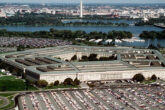May 04, 2018
CNAS Commentary: Major Challenges Ahead for Commercial Space Regulators
At a Washington D.C. event on Monday April 30th Scott Pace, Executive Secretary of the National Space Council, remarked on the need for regulatory reform for commercial space activities. The regulatory challenges reflect the difficult balance between enabling the commercial sector and protecting critical U.S. national security interests and international obligations. NOAA, the administration responsible for licensing commercial remote sensing systems, will have a uniquely difficult time balancing priorities as technology advances and new services, like EarthNow, spring up.
Commercial remote sensing is broadly defined but includes all space-borne systems which actively or passively collect data of the Earth’s surface. The US Land Remote Sensing Policy Act (1992) hoped to stimulate the development of the commercial market while preserving “national security interests, foreign policy and international obligations.” In addition to the Act, National Security Presidential Directive 27, Licensing of Private Land Remote Sensing Space Systems; Final Rule (2006), and the latest Memorandum of Understanding between Departments of Commerce, State, Defense, Interior, the Office of the Director of National Intelligence, and the Joint Chiefs of Staff concerning the Licensing and Operation of Commercial Remote Sensing Satellite Systems (April 2017) reflect the evolution of U.S. CRS regulations and the bureaucracy that exists within current practices.
EarthNow (a new startup backed by SoftBank, OneWeb, Bill Gates, and Airbus) plans to launch a constellation of hundreds of satellites to provide continuous global video of the earth in real-time. Real-time video of the entire earth does not currently exist for military purposes, let alone commercially. Though the technical advancement would bring much needed military capacity to the U.S. intelligence, surveillance, and reconnaissance architecture, the mass market product will likely conflict with U.S. interests and obligations, even at degraded imagery resolutions. The system will also raise individual privacy concerns, which are not currently addressed in commercial remote sensing policies.
There are big technical and functional differences between daily still photos currently available through companies like Planet or Google Earth and real-time video. As technology continues to evolve and proliferate, the average person gains access to resources once reserved for only the wealthiest of states, changing the strategic dynamic. Regardless of where U.S. regulators are now, the technology is quickly evolving and these issues will have to be addressed sooner or later — including whether or not the government needs to own constellations or just use commercial services. The challenge going forward will be to create practical regulatory frameworks which allow the commercial remote sensing market to develop at a pace matching commercial innovation.
More from CNAS
-
Stock Buybacks in Defense: What Drives Them, and How That Can Change?
Lack of capital is not a problem hindering investment at the largest defense primes. The issue revolves around the capital allocation decision....
By Mikhail Grinberg, Jerry McGinn & Lloyd Everhart
-
Ukrainian president has stark new warning as war rages on
Ukrainian President Volodymyr Zelensky warns that Ukraine will lose the war with Russia without US assistance. Franz-Stefan Gady of CNAS explains why US military aid is crucia...
By Franz-Stefan Gady
-
Sharper: Maritime Security
The importance of securing the maritime domain is rapidly increasing. From the South China Sea to the Red Sea, the U.S. and its allies are experiencing escalating challenges t...
By Anna Pederson & Charles Horn
-
Innovation Adoption for All: Scaling across Department of Defense
The Department of Defense does act quickly when properly motivated and catalyzed by effective leadership....
By Robert O. Work, Michael Brown & Ellen Lord




